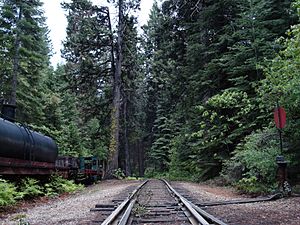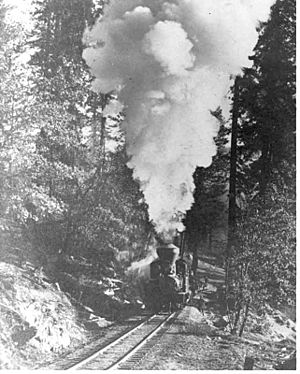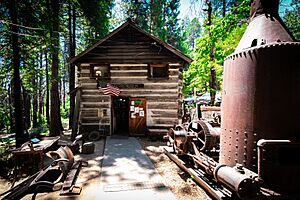Yosemite Mountain Sugar Pine Railroad facts for kids
Quick facts for kids Yosemite Mountain Sugar Pine Railroad |
|
|---|---|
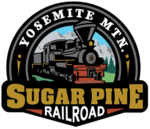 |
|
| The Logger | |
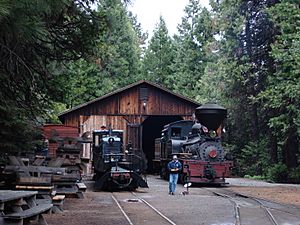
Yosemite Mountain Sugar Pine Railroad's Shay No. 10 backing into the shops after a run on the line.
|
|
| Locale | Sierra National Forest, California |
| Coordinates | 37°27′12″N 119°38′39″W / 37.45341850796343°N 119.64421860264505°W |
| Commercial operations | |
| Built by | California Lumber Company |
| Original gauge | 3 ft (914 mm) |
| Preserved operations | |
| Owned by | Stauffer family |
| Reporting mark | YMSP |
| Length | 4 mi (6.4 km) |
| Preserved gauge | 3 ft (914 mm) |
| Commercial history | |
| Opened | 1874 |
| Closed | 1931 |
| Preservation history | |
| 1961 | Reopened |
| Headquarters | 56001 State Route 41 Fish Camp, California |
The Yosemite Mountain Sugar Pine Railroad (YMSPRR) is a special old train line. It has two working steam locomotives. You can find it near Fish Camp, California, in the Sierra National Forest. This spot is close to the southern entrance of Yosemite National Park.
Rudy Stauffer started the YMSPRR in 1961. He used old train tracks, cars, and engines to build a fun train ride. This new line followed the path of the old Madera Sugar Pine Lumber Company railroad.
The railroad began with a large engine called Shay No. 10. This engine was bought from the West Side Lumber Company railway. It was built in 1928 and is thought to be the biggest narrow gauge Shay engine ever made. In 1986, the YMSPRR bought another Shay engine, No. 15. It also came from the West Side Lumber Company.
The steam engines run every day during the summer. In other seasons, smaller "Jenny" railcars are used. These cars can carry about 12 passengers. You can ride in open-air cars or enclosed ones.
The Railroad's Story
The train tracks you see today follow a path made long ago. The Madera Sugar Pine Lumber Company built it in the early 1900s. This company started in 1874 as the California Lumber Company. Their goal was to cut down trees around Oakhurst, California.
The Madera Sugar Pine Lumber Company had a huge sawmill in Sugar Pine, California. This town was just south of where the YMSPRR is now. The company had seven engines and over 100 log cars. They also had 140 miles (225 km) of track in the mountains.
Besides the railroad, the company moved lumber using a long water slide called a flume. This flume stretched 54 miles (87 km) from Sugar Pine to Madera, California. It was the best way to get rough lumber out of the mountains. The company cut down almost every tree in the areas around the YMSPRR track.
Today, the thick forest hides this history. But you can still see large stumps from the original old trees along the tracks. The lumber company closed in 1931 because of the Great Depression and a lack of trees.
However, the old train path through the forest remained. This allowed the Stauffer family to rebuild part of the line in 1961. The current railroad uses engines and other equipment bought from the West Side Lumber Company. That company stopped its train operations in 1961.
Rudy Stauffer retired in 1981. His son, Max, then became the owner and operator of the railroad. Max Stauffer passed away on March 10, 2017. In August 2017, a fire called the Railroad Fire started near the railroad. It sadly destroyed some West Side Lumber Company equipment stored on a side track.
Amazing Locomotives
The Yosemite Mountain Sugar Pine Railroad has a cool collection of old engines. Two of them are working steam locomotives:
| Locomotive | Type | Year Built | Manufacturer | Details | Image |
|---|---|---|---|---|---|
| No. 10 | Narrow Gauge Shay Locomotive | 1928 | Lima Locomotive Works | This is said to be the biggest narrow gauge Shay engine ever built. It first worked for Pickering Lumber Company, then for the West Side Lumber Company. It burns oil and can hold 1,200 US gallons (4,500 L) of oil and 3,400 US gallons (13,000 L) of water. | 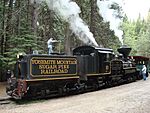 |
| No. 15 | Narrow Gauge Shay Locomotive | 1913 | Lima Locomotive Works | This engine worked for many companies before joining YMSPRR in 1988. It burns oil and can hold 1,000 US gallons (3,800 L) of oil and 2,000 US gallons (7,600 L) of water. | 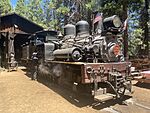 |
| "Jenny" Railcars | Converted Ford Model A | 1927-1931 | Ford Motor Company | These are Ford Model A cars changed to run on rails. The West Side Lumber Company converted them. Each car fits about 12 people and is used for regular rides. |  |
| No. 5 | Diesel Switch Engine | 1935 | Not specified | This is a two-axle diesel engine. It is not currently working. |  |
| No. 402 | Center Cab Diesel Locomotive | Not specified | Not specified | This is a diesel engine with two trucks. The YMSPRR does not use it for regular rides. |  |
Fun Things to See and Do
- The Thornberry Museum is in an old log cabin, 140 years old! It shows what life was like in the Sierra mountains long ago.
- The Sugar Pine Trading Company has books and information about the YMSPRR and the history of Yosemite Valley.
- The Lewis Creek Amphitheater is reached by the steam train. It has shows like jazz music and fun plays during certain seasons.
- There are picnic and event areas at the end of the train line.
- You can try gold panning!
- See a rare narrow gauge snowplow, West Side Lumber Company's plow No. 2.
See also
- List of heritage railroads in the United States
- Yosemite National Park
 | James B. Knighten |
 | Azellia White |
 | Willa Brown |


